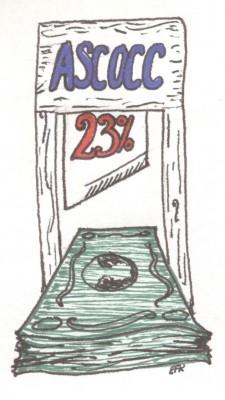In 1975, students paid only $13 per credit hour: Now you pay $87.
When Central Oregon Community College first opened its doors back in 1949 it saw equal distribution between funding sources, with tuition accounting for only 25 percent and state accounting for 50 percent of the overall budget. Now, tuition and state funding have shifted, with tuition now accounting for almost half of the same budget. While most years tuition goes up no more than a dollar, in some years tuition has made a jump of $5 in 1991-92 to $6 in 2004-05 and then again in 2010 -’11.
“If we go back 10 or 15 years, we see that the state contribution was around 40 to 50 percent, but as the years go by we have seen those numbers change to the 13 percent it is today,” said Alicia Moore, dean of student and enrollment services.
Moore, who has been at COCC for 18 years, says she is constantly working with the board to keep cost down and allow for new ways to restructure the budget.
“There are 17 community colleges in Oregon, and several of them have already crossed over the $100 mark. Our board is giving us the directive to strive to be in the lower third of all Oregon’s Community Colleges,” Moore said.
Recently COCC’s campus leadership proposed a one dollar tuition increase, recognizing there were costs that needed to be met.
This proposed increase would only generate around $180,000 in revenue, but upon examination the board voted against it, according to Moore, choosing instead to “look at the different budgets in the school and see if we [the board] could reassign some dollars,” all with tuition cost in mind.
“The greatest increases we’ve had have definitely been over the last 10 years,” said Ron Paradis, director of community relations.
In 1991, when Paradis started his job at COCC, tuition was at $24. He too recognizes the attributing factors to the increase.
“The bigger increases we see are the result of our state funding and how it has changed so dramatically over the years,” Paradis said.
But the good news, according to both Moore and Paradis, is that property tax money has been historically stable.
“Not only is tax money more stable, but we believe our state money will go up, hopefully,” Paradis said.
According to Moore, COCC’s prices will continue to be less when compared to the tuition prices of the big universities in Oregon.
“When we combined tuition and fees, COCC’s price is two thirds the cost of an university and have been at the lower percentile of Oregon’s community colleges,” Moore said.
Brayan Gonzalez | The Broadside
(contact [email protected])















George Williams | Apr 23, 2014 at 3:58 pm
According to DegreeRegistry.org , a general MBA can be obtained for as little as $6k and as high as $120k. If students would do a little research, they would find that it is not nearly as expensive to get a college degree
George Williams | Apr 23, 2014 at 3:58 pm
According to DegreeRegistry.org , a general MBA can be obtained for as little as $6k and as high as $120k. If students would do a little research, they would find that it is not nearly as expensive to get a college degree